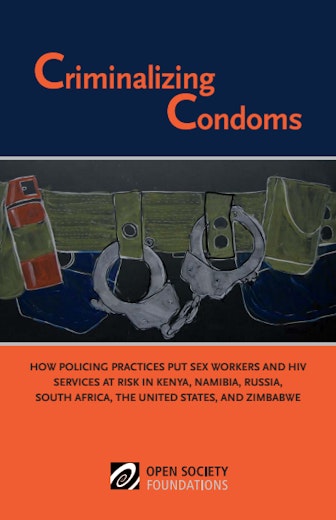“Why Do They Take Our Condoms, Do They Want Us to Die?”
By Rachel Thomas

Several years ago a sex worker in Macedonia told me that she’d had condoms with her when she was taken into custody by law enforcement, and that the police refused to return her money or condoms when she was released. It was late, and home was too far away to walk, so she had unprotected sex with a client in order to afford the bus. Over the years, I’ve heard similar stories from sex workers around the world. Criminalizing Condoms, a 6-country report released today by the Open Society Foundations, documents the legal and illegal confiscation of condoms by police and the grave repercussions on sex workers’ lives and health.
Countries around the world continue to grapple with growing HIV epidemics, and sex workers often disproportionately bear the brunt. Tens of millions of public and private dollars have been spent on condom distribution and promotion programs targeting sex workers and their clients; at the same time, police are taking away these condoms and creating a massive disincentive that counters these public health efforts. A sex worker in South Africa recalls, “Two years ago I was strolling on Milnerton beach, cops asked me if I had any condoms. I replied yes and he made me give them to him and said I wasn’t permitted to carry condoms.” This experience echoes what countless other men, women and transgender individuals involved in selling sex recount. In South Africa, UNAIDS estimates the HIV prevalence rate for those aged 15 to 49 at 18 percent, and it is suspected that the rate is higher among sex workers. Public health programs targeting sex workers will fail unless policing policies and practices are brought into alignment with public health goals and human rights principles.
The issue is not isolated to one or two countries, but rather indicates that legal and illegal condom confiscation from sex workers is a wide spread practice. More than 40 percent of sex workers surveyed in Kenya, Namibia, Russia, South Africa, the United States, and Zimbabwe reported that police had taken condoms from them making it more likely that they would have unprotected sex with their clients. In Russia, this figure rose to 80 percent. In the U.S., more than half of the sex workers surveyed said there had been times when they had opted not to carry condoms because they were afraid it would mean problems with police. While the statistics are revealing, and call for more research to be conducted on policing practices and health risks for sex workers, the stories of struggle and survival are much more compelling.
Criminalizing Condoms calls on police to cease the confiscation of condoms from sex workers and outreach works as a matter of policy and establish trainings for their officers about HIV and the importance of condom use to prevent its spread. Ultimately, however, the report calls on governments to decriminalize sex work and remove administrative sanctions. The call for decriminalizing sex work in order to advance the human rights and health of marginalized groups is increasingly heard. Last week, the United Nations’ Global Commission on HIV and the Law released its report documenting evidence and recommendations from over 1,000 people across 140 countries. Its first recommendation to national governments is to repeal laws that prohibit consenting adults from buying or selling sex, as well as laws that otherwise prohibit commercial sex.
The International AIDS Conference takes place next week in Washington, D.C. The usual cast of government officials, scientists, NGO implementers, and AIDS activists will come to better understand how we can collectively get to an AIDS free world. Now, More than Ever, we need to recognize the human rights of sex workers - and the foolishness of giving condoms with one hand of the government only to have them taken away by another.
Until June 2014, Rachel Thomas was a program officer with the Sexual Health and Rights Project, part of the Open Society Public Health Program.
